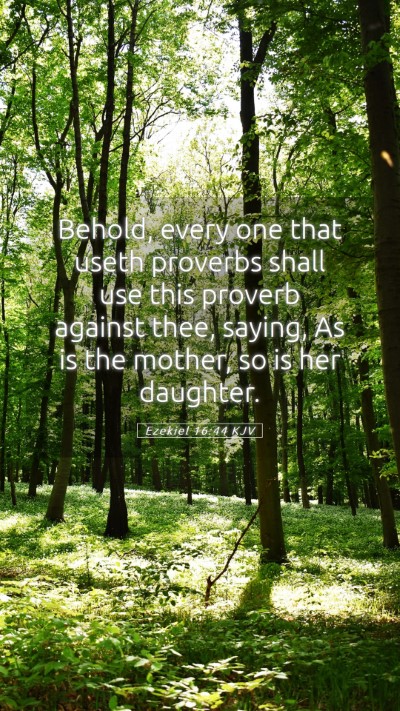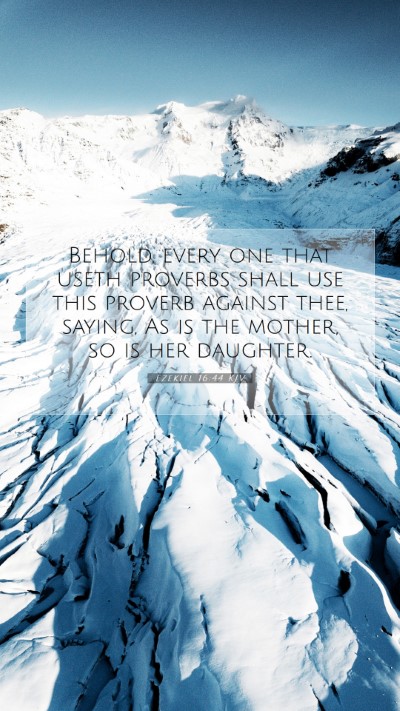Ezekiel 16:44 - Understanding the Verse
Verse: "Behold, everyone that useth proverbs shall use this proverb against thee, saying, As is the mother, so is her daughter."
Bible Verse Meanings
The meaning of Ezekiel 16:44 can be deeply understood by examining its historical and cultural context. In this verse, God communicates to Jerusalem, which is represented as a mother, and the people of Jerusalem as her daughters. This verse highlights the close relationship between the identity and behaviors of the people and their city.
Bible Verse Interpretations
- Matthew Henry's Commentary: Henry elaborates on how the behaviors and characteristics of a mother will often be reflected in her children. Thus, this proverb serves as a reflection on the character of Jerusalem and its inhabitants.
- Albert Barnes’ Notes: Barnes emphasizes that this proverb indicates more than a mere familial relationship; it represents a community's moral standing. The actions and sins of the mother (Jerusalem) are mirrored by her daughters (the people).
- Adam Clarke’s Commentary: Clarke interprets this verse as a symbolic representation of the corruption that has taken root in Jerusalem. The mother-daughter imagery conveys that the city's sinfulness is evident in its people.
Bible Verse Understanding
Ezekiel 16:44 serves as a reminder that the societal influence is significant, and behaviors of one generation often shape the next. It underscores the importance of returning to righteousness, demonstrating how collective accountability exists within a community. Understanding this scripture requires recognizing the themes of judgment, identity, and moral influence.
Bible Verse Explanations
The phrase "As is the mother, so is her daughter" emphasizes the idea that one's inherent nature or character can be predicted by familial patterns. This serves to instruct the Israelites to reflect on their ways and the origins of their transgressions.
Scripture Analysis
In the broader context of Ezekiel, this verse aligns with themes of judgment against Israel for idolatry and unfaithfulness. The metaphor of mother and daughter serves not only as a critique but also as a call for introspection within the community.
Biblical Exegesis
This verse demonstrates how poetic structures in scripture carry deep theological significance, often providing a rhetorical devices that reveal cultural and religious critiques. By using familiar imagery, the prophet Ezekiel communicates effectively with his audience, prompting them towards self-reflection.
Bible Study Insights
When analyzing Ezekiel 16:44, it’s crucial to consider how this verse impacts readers in a contemporary setting. It poses questions about how personal behavior correlates to community identity, compelling us to consider how our actions influence future generations.
Related Cross References
- Proverbs 10:1: "A wise son maketh a glad father: but a foolish son is the heaviness of his mother."
- Jeremiah 31:29-30: "In those days they shall say no more, The fathers have eaten a sour grape, and the children's teeth are set on edge."
- Ezekiel 18:2: "What mean ye, that ye use this proverb concerning the land of Israel, saying, The fathers have eaten sour grapes, and the children's teeth are set on edge?"
Conclusion
In conclusion, Ezekiel 16:44 serves as a powerful reminder of how collective identities are shaped by individual behaviors. Through the lens of this verse, we gain significant Bible study insights that encourage reflection on the moral state of our communities. Integrating this verse into Bible study groups can foster rich discussions about generational influence and righteousness in our lives.


